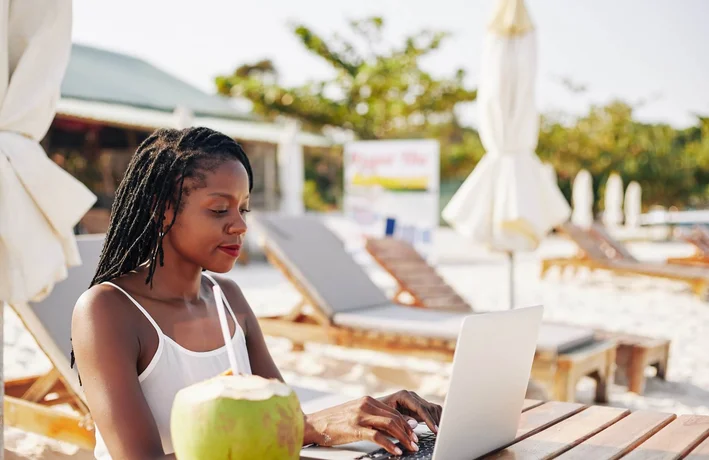The digital nomad lifestyle offers the incredible freedom to work from anywhere in the world, but it also comes with its own set of financial challenges. Managing your money while hopping from country to country requires careful planning, strategic decision-making, and an understanding of global financial systems. This guide provides an in-depth look at how you can manage your finances effectively as a digital nomad, ensuring that you not only sustain your lifestyle but also build a secure financial future.
Creating a Digital Nomad Budget
Budgeting is more than just tracking your income and expenses; it’s about creating a financial roadmap that ensures you can sustain your lifestyle while achieving your long-term goals. Here’s how to do it:
- Track Every Source of Income: As a digital nomad, your income might come from various sources—freelance gigs, remote work, passive income streams, or even short-term projects. Use financial tracking apps like QuickBooks, FreshBooks, or Mint to consolidate and categorize your income. Make sure you understand when and how you’re getting paid (e.g., weekly, monthly, in what currency, etc.), so you can plan accordingly.
- Categorize Your Expenses: Break down your expenses into categories—essential (rent, food, insurance), semi-essential (internet, mobile plan, coworking spaces), and non-essential (entertainment, dining out). The cost of living can vary drastically from one country to another, so research and adjust your budget according to your location. Websites like Numbeo or Expatistan can help you compare living costs between cities.
- Factor in Location-Specific Costs: Different countries come with different costs, from visa fees to transportation. For example, Southeast Asia may offer affordable living with $1 meals and $15 hostel stays, whereas European cities could cost significantly more. Include these variables in your budget planning. Additionally, consider healthcare costs—some countries might require you to pay out-of-pocket for medical services, while others might have insurance plans available for expats.
- Emergency Fund: A non-negotiable aspect of your budget should be your emergency fund. Aim for at least 6-12 months’ worth of expenses stored in a high-interest savings account or a liquid investment like a money market fund. This fund will be your safety net for unexpected events such as a sudden loss of income, medical emergencies, or urgent travel needs.
- Contingency Planning: Besides an emergency fund, include a contingency buffer in your monthly budget for unpredictable expenses like sudden flights home, medical emergencies not covered by insurance, or an unexpected rise in living costs due to political or economic changes in your host country.
How To Manage Multiple Currencies
Navigating multiple currencies is a daily reality for digital nomads. Without proper management, currency conversion can eat into your budget. Here’s how to handle it efficiently:
- Multi-Currency Accounts and Apps: Multi-currency accounts like Wise, Revolut, and Payoneer allow you to hold and transfer money in various currencies with lower fees than traditional banks. These platforms often offer competitive exchange rates and the ability to set up local bank accounts in multiple countries. Wise, for instance, provides you with bank details in different currencies, which is useful for getting paid by clients in their local currency.
- Optimal Timing for Conversions: Exchange rates fluctuate due to various factors, including geopolitical events, interest rates, and economic forecasts. Use apps like XE, CurrencyFair, or OANDA to monitor these rates. Consider converting large amounts when the rates are favorable to maximize your funds. Setting up rate alerts can help you exchange at the best times.
- Minimizing ATM Fees and Conversion Costs: Always withdraw larger sums to minimize the number of transactions, as ATM fees can be substantial, especially in countries with less developed banking systems. Look for ATMs that don’t charge local fees or use cards that refund ATM fees, such as those offered by Charles Schwab. Be aware of the “dynamic currency conversion” (DCC) trap—always choose to be charged in the local currency rather than your home currency to avoid inflated conversion rates.
- Keeping Track of Multiple Balances: If you’re holding money in multiple currencies, it’s essential to keep track of each balance and its equivalent value in your base currency. This helps you understand your total financial standing at any given time. Consider using a dedicated app or spreadsheet to track and manage these balances efficiently.
Digital Nomad Taxes: Cross-Border Compliance
Taxation is one of the most complex aspects of being a digital nomad, particularly if you’re earning income in multiple countries or have unclear residency status. Here’s a deeper dive into what you need to know:
- Understanding Tax Residency: Your tax residency status dictates where and how much tax you owe. Some countries, like the U.S., tax citizens on worldwide income regardless of where they live, while others determine tax liability based on physical presence or residency status. Familiarize yourself with the “183-day rule,” which many countries use to establish tax residency. Keep a meticulous travel log, detailing your days spent in each country to avoid complications.
- Utilizing Tax Treaties: Many countries have tax treaties that can prevent double taxation. For example, if you pay taxes in a foreign country, you might be eligible for a credit or exemption on your home country’s taxes. Understanding these treaties and how they apply to your situation can save you thousands of dollars annually. Websites like the IRS for U.S. citizens or your home country’s tax authority often have treaty details available online.
- Foreign Earned Income Exclusion (FEIE): If you’re a U.S. citizen or resident alien living abroad, you might qualify for the FEIE, which allows you to exclude a certain amount of your foreign-earned income from U.S. taxes (over $100,000 as of 2024). To qualify, you must meet either the Bona Fide Residence Test or the Physical Presence Test. Keep thorough records to support your claim, as the IRS may require proof of your foreign residency.
- Offshore Accounts and Reporting Requirements: If you hold foreign bank accounts or investments, you may need to file additional reports, such as the Foreign Bank Account Report (FBAR) or Form 8938 (FATCA) for U.S. citizens. The penalties for failing to report these accounts can be severe, so ensure you understand your reporting obligations.
- Hiring a Tax Advisor: Consider hiring a tax professional who specializes in international taxation and has experience with digital nomads. They can help you optimize your tax situation, take advantage of tax treaties, and ensure you’re compliant with all relevant regulations. This can be especially valuable if you have a complex financial situation involving multiple income streams, business ownership, or investments.
Digital Nomad Insurance: Protecting Your Health, Assets, and Peace of Mind
Insurance is a vital part of your financial plan as a digital nomad, providing coverage for unexpected events that could otherwise lead to financial ruin. Here’s a closer look at the types of insurance you should consider:
- Comprehensive Health Insurance: Digital nomads need health insurance that covers medical expenses globally. Look for policies that offer comprehensive coverage, including emergency evacuation, outpatient care, and hospitalization. SafetyWing, IMG Global, and Cigna Global are popular providers that cater to the needs of digital nomads. Compare policies to ensure they cover pre-existing conditions, mental health services, and routine care in the countries where you plan to spend the most time.
- Travel Insurance for Frequent Travelers: Even with health insurance, travel insurance is essential for covering trip cancellations, lost luggage, stolen electronics, and emergency evacuations. World Nomads and Allianz are two of the most reputable providers, offering customizable plans that cater to long-term travelers. Ensure your policy covers high-value items like laptops, cameras, and smartphones, which are essential tools for many digital nomads.
- Income Protection and Disability Insurance: If you rely on your income to sustain your lifestyle, disability insurance can provide a safety net if you’re unable to work due to illness or injury. This is particularly important for freelancers and self-employed individuals who don’t have employer-provided benefits. Check with providers like Lloyd’s of London or search for local providers in countries with favorable insurance terms.
- Liability Insurance: If you’re running a business or working as a freelancer, professional liability insurance (also known as errors and omissions insurance) can protect you from claims related to your work. This is crucial if you provide consulting services, design, or other professional services where a mistake could lead to a lawsuit.
Digital Nomad Saving and Investing
Saving and investing are crucial for ensuring long-term financial stability, even when you’re constantly on the move. Here’s how to effectively save and invest as a digital nomad:
- Automate Your Savings: Consistency is key when it comes to saving. Set up automatic transfers from your main account to a savings or investment account each month. Consider using high-yield savings accounts or online banks like Ally or Synchrony that offer competitive interest rates and no minimum balance requirements.
- Investing in the Stock Market: As a digital nomad, you can invest in the stock market through online platforms like Vanguard, Fidelity, or international platforms like Interactive Brokers. Consider using robo-advisors like Betterment or Wealthfront, which automatically manage and rebalance your portfolio based on your risk tolerance and goals. If you’re new to investing, these platforms offer an easy entry point with low fees and diversified portfolios.
- Diversify Your Investments: Diversification is crucial to minimizing risk, especially when your income might be unpredictable. In addition to stocks and bonds, consider alternative investments such as real estate (via platforms like Fundrise or RealtyMogul), peer-to-peer lending (through Prosper or LendingClub), or even cryptocurrencies. Keep in mind that each of these options comes with different levels of risk, so it’s important to do your research or consult with a financial advisor.
- Retirement Planning for Digital Nomads: Contribute regularly to retirement accounts, even if you’re self-employed. For U.S. citizens, options include Traditional or Roth IRAs, Solo 401(k)s, or SEP IRAs, depending on your income level and tax situation. If you’re an expat, explore international pension plans or offshore accounts. Additionally, research whether your home country offers tax benefits for contributing to a retirement account while living abroad.
- Building a Safety Net Through Liquid Investments: In addition to your emergency fund, consider investing in liquid assets that can be easily converted to cash if needed. This could include short-term bonds, money market funds, or even a portion of your investment portfolio in low-risk assets. Having liquid investments ensures that you can access funds quickly without having to sell off long-term investments at a loss.
Digital Nomad Banking
Efficient banking is crucial for managing your finances on the go. Here’s how to set up your banking to support your digital nomad lifestyle:
- Choosing the Right Bank: Opt for banks that offer robust online banking services, low or no foreign transaction fees, and worldwide ATM access. Charles Schwab’s High Yield Investor Checking Account, for example, offers unlimited ATM fee rebates worldwide and no foreign transaction fees. N26, a popular choice among European nomads, provides free ATM withdrawals in euros and a sleek mobile app that makes managing your money easy.
- Managing Currency Fluctuations with Multi-Currency Accounts: As previously mentioned, multi-currency accounts like Wise, Revolut, and Payoneer allow you to manage your money across different currencies with minimal fees. These accounts are particularly useful if you receive payments in different currencies or need to transfer money internationally frequently.
- Using Credit Cards to Your Advantage: Credit cards can be a powerful tool if used responsibly. Look for cards that offer rewards points, travel perks (like free hotel stays or flights), and no foreign transaction fees. Cards like the Chase Sapphire Preferred and American Express Platinum are popular among digital nomads for their travel rewards and robust travel protection benefits. Additionally, some cards offer airport lounge access, which can be a lifesaver during long layovers.
- Setting Up Alerts and Notifications: Enable banking alerts for all your accounts to monitor transactions, low balances, or suspicious activity. This is especially important when using cards internationally, where fraud can be more common. Many banks and credit cards allow you to customize alerts via email or SMS, ensuring you’re always in the loop about your finances.
Building Wealth as a Digital Nomad
Building wealth as a digital nomad involves more than just earning and saving money—it’s about creating a sustainable financial strategy that grows your wealth over time. Here’s how to do it:
- Diversifying Income Streams: To achieve financial stability, consider diversifying your income beyond your primary job or freelancing gigs. This could involve launching a side business, creating digital products (like e-books, courses, or apps), or investing in real estate through platforms like Airbnb. Diversified income streams reduce reliance on a single source and provide more financial security.
- Generating Passive Income: Passive income is key to building wealth without constantly trading your time for money. Start a blog, YouTube channel, or podcast, and monetize it through ads, sponsorships, or affiliate marketing. Invest in dividend-paying stocks, REITs (Real Estate Investment Trusts), or create and sell digital products that generate revenue over time.
- Networking with Other Digital Nomads: The digital nomad community is a valuable resource for networking, finding job opportunities, and learning from others. Platforms like Nomad List, Meetup, and Facebook groups offer ways to connect with like-minded individuals. Attend digital nomad conferences, coworking meetups, or join online communities to expand your network and discover new opportunities.
- Reinvesting Earnings: As your income grows, reinvest a portion of it into your business, education, or investments. Whether it’s upgrading your equipment, taking a course to learn new skills, or investing in a new income stream, reinvesting earnings is essential for long-term growth and success.
Digital Nomad Financial Discipline on the Road
Maintaining financial discipline while constantly moving and experiencing new adventures can be challenging. Here’s how to stay on track:
- Set Specific Financial Goals: Whether you’re saving for a major purchase, planning for early retirement, or aiming to hit a certain net worth, having clear, specific goals will keep you focused. Break down your goals into actionable steps and regularly track your progress.
- Monthly Financial Check-Ins: Dedicate time each month to review your finances—update your budget, check your investment performance, and assess your progress toward your goals. This regular check-in will help you catch any issues early and make necessary adjustments.
- Continue Financial Education: Personal finance is an ever-evolving field, and staying informed is crucial. Follow financial blogs, listen to podcasts like ChooseFI or The Mad Fientist, and read books like “The Simple Path to Wealth” by JL Collins or “Your Money or Your Life” by Vicki Robin. The more you know, the better equipped you’ll be to make smart financial decisions.
- Balancing Work and Leisure: As a digital nomad, it’s easy to either overwork or overspend on leisure activities. Find a balance that allows you to enjoy your travels while staying productive and financially responsible. Use productivity tools like Trello or Asana to manage your work tasks, and set a dedicated budget for leisure activities to prevent overspending.
Final Thoughts
Mastering personal finance as a digital nomad is a journey that requires careful planning, adaptability, and continuous learning. By setting up a sustainable budget, managing multiple currencies, staying tax-compliant, securing the right insurance, and building wealth through saving and investing, you can live the digital nomad lifestyle with financial confidence. Remember, the goal is not just to maintain your lifestyle but to thrive and build a secure financial future, no matter where in the world you are.
Safe Travels!





